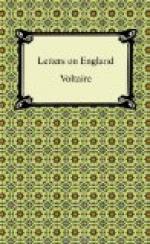Fox, this modern patriarch, spoke thus to a justice of peace before a large assembly of people: “Friend, take care what thou dost; God will soon punish thee for persecuting His saints.” This magistrate, being one who besotted himself every day with bad beer and brandy, died of an apoplexy two days after, the moment he had signed a mittimus for imprisoning some Quakers. The sudden death with which this justice was seized was not ascribed to his intemperance, but was universally looked upon as the effect of the holy man’s predictions; so that this accident made more converts to Quakerism than a thousand sermons and as many shaking fits could have done. Oliver, finding them increase daily, was desirous of bringing them over to his party, and for that purpose attempted to bribe them by money. However, they were incorruptible, which made him one day declare that this religion was the only one he had ever met with that had resisted the charms of gold.
The Quakers were several times persecuted under Charles II.; not upon a religious account, but for refusing to pay the tithes, for “theeing” and “thouing” the magistrates, and for refusing to take the oaths enacted by the laws.
At last Robert Barclay, a native of Scotland, presented to the King, in 1675, his “Apology for the Quakers,” a work as well drawn up as the subject could possibly admit. The dedication to Charles II. is not filled with mean, flattering encomiums, but abounds with bold touches in favour of truth and with the wisest counsels. “Thou hast tasted,” says he to the King at the close of his epistle dedicatory, “of prosperity and adversity; thou knowest what it is to be banished thy native country; to be overruled as well as to rule and sit upon the throne; and, being oppressed, thou hast reason to know how hateful the Oppressor is both to God and man. If, after all these warnings and advertisements, thou dost not turn unto the Lord with all thy heart, but forget Him who remembered thee in thy distress, and give up thyself to follow lust and vanity, surely great will be thy condemnation.
“Against which snare, as well as the temptation of those that may or do feed thee and prompt thee to evil, the most excellent and prevalent remedy will be, to apply thyself to that light of Christ which shineth in thy conscience, which neither can nor will flatter thee nor suffer thee to be at ease in thy sins, but doth and will deal plainly and faithfully with thee, as those that are followers thereof have plainly done.—Thy faithful friend and subject, Robert Barclay.”
A more surprising circumstance is, that this epistle, written by a private man of no figure, was so happy in its effects, as to put a stop to the persecution.
LETTER IV.—ON THE QUAKERS
About this time arose the illustrious William Penn, who established the power of the Quakers in America, and would have made them appear venerable in the eyes of the Europeans, were it possible for mankind to respect virtue when revealed in a ridiculous light. He was the only son of Vice-Admiral Penn, favourite of the Duke of York, afterwards King James II.




